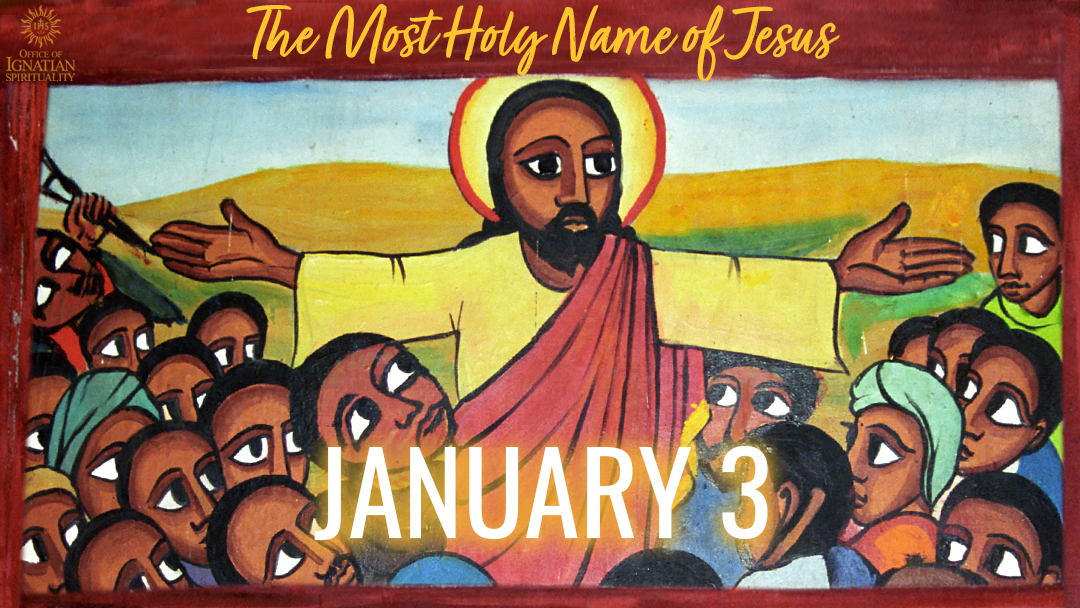January 3
The Most Holy Name of Jesus
(Titular Feast of the Society of Jesus)
Solemnity
Scripture Readings
First Reading: Sir 51:8-12 (Vulgate 51:11-17)
Second Reading: Phil 2:1-11
Responsorial Psalm: Ps 8:4-5, 6-7, 8-9
Alleluia Verse: Matt 1:21b
Gospel: Luke 2:21-24
Reflection on Today’s Feast
By Fr. Harry Geib, SJ
As a Jesuit, I sign my name with the post-nominal initials “S.J.” which stand for the “Society of Jesus.” Every time I sign my name with these initials, I am reminded that my life is focused on Jesus. This is a source of great happiness for me. Since Jesuits are formally called by the name of Jesus, this feast is a Jesuit Solemnity because it is our titular (“title”) feast day. The founding document of the Society of Jesus, The Formula of the Institute, begins with these words:
"Whoever desires to serve as a soldier of God beneath the banner of the cross in our Society, which we desire to be designated by the name of Jesus, and to serve the Lord alone and the Church, His spouse, under the Roman pontiff, the vicar of Christ on earth..."
In the liturgical calendar, the Feast of the Most Holy Name of Jesus is assigned to January 3rd. This year, however, it is moved to January 4th since January 3rd falls on the Sunday which is the Solemnity of the Epiphany of the Lord.
The feast of the Most Holy Name of Jesus has been celebrated in the Roman Catholic Church, at least at local levels, since the end of the fifteenth century. Historically, the celebration has been held on different dates, because 1 January, eight days after Christmas, commemorates the naming of the child Jesus, as recounted in the Gospel read on that day: "at the end of eight days, when he was circumcised, he was called Jesus, the name given by the angel before he was conceived in the womb." The name of Jesus means Savior. Recall that this name and its meaning it had been revealed in a dream to Joseph and to Our Lady at the Annunciation by the Archangel Gabriel.
Devotion to the Holy Name is deeply rooted in the Sacred Scriptures, especially in the Acts of the Apostles. It was promoted in a special manner by St. Bernard, St. Bernardine of Siena, St. John Capistrano and by the Franciscan Order. It was extended to the whole Church in 1727 during the pontificate of Innocent XIII, and the month of January has traditionally been dedicated to the Holy Name of Jesus.
This feast is meant to impress on us Christians the dignity of the Holy Name. It is a relatively new feast, stemming out of devotional piety. Nevertheless, it is not difficult to find in it some liturgical or ancient Christian dogma. What did a name signify originally? The name should express the nature of a thing. Thus, Adam in paradise gave the animals names in accordance with their being. Among the Jews, God's name expressed His essence, Yahweh, i.e., I (alone) am who am (and cause all else to be). The Jews had the highest respect for the name of God, a reverence that finds continuation in the Our Father: "Hallowed be Thy Name."
Persons prominent in the history of salvation often received their names from God. Adam — man of the earth; Eve — mother of all the living; Abraham — father of many nations; Peter — the rock. The Savior's precursor was given the name God assigned him. According to divine precedent, then, the name of the Redeemer should not be accidental, of human choosing, but given by God Himself. For His name should express His mission. We read in Sacred Scripture how the angel Gabriel revealed that name to Mary:
"You shall call His name Jesus." And to St. Joseph the angel not merely revealed the name but explained its meaning: "You shall call His name Jesus, for He shall save His people from their sins." [Excerpted from The Church's Year of Grace, Rev. Pius Parsch]
The Messiah should not only be the savior but should be called Savior. With Jesus, therefore, the name tells the purpose of His existence. In Matthew’s Gospel we are told “ … and his name shall be called “Emmanu-el” which means “God with us.”
Happy feast!
The Jesuit Lectionary is a project of the Office of Ignatian Spirituality and the USA East Jesuit Province Vocations Office. For more information about becoming a Jesuit, visit BeaJesuit.org.


